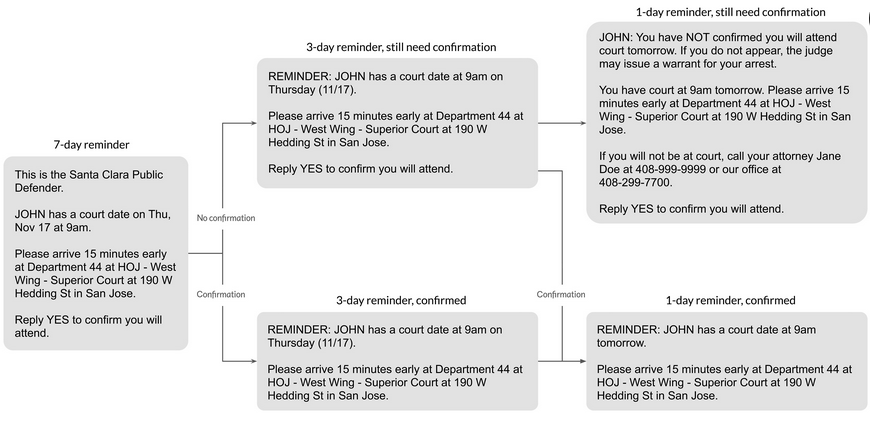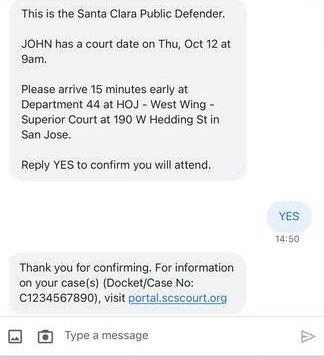Automated SMS Reminders: Just 60 Cents to Reduce Missed Court Dates
The first study specifically examining the impact of reminders for public defender clients was published on October 1, titled “Automated reminders reduce incarceration for missed court dates: Evidence from a text message experiment.”
The authors of the study are Alex Chohlas-Wood from New York University, Madison Coots, Joe Nudell, Todd Rogers, and Sharad Goel from Harvard Kennedy School, and Julian Nyarko and Emma Brunskill from Stanford University.
As researchers explain, in the United States, after a person is arrested and charged with a crime, they are either held in jail or released and asked to appear in court voluntarily. However, a problem arises when some individuals fail to appear in court. In almost every jurisdiction, this is considered a crime. The percentage of nonappearances ranges from 10 to 20%, with some areas reporting rates as high as 50%.
This can lead to the issuance of arrest warrants, which judges often issue when a defendant fails to attend a mandatory hearing. The defendant is then held in jail to ensure their appearance in court. These types of arrests are the most common reason for jail admission in many U.S. jurisdictions, accounting for 14 to 30 percent of all arrests, the authors explain. This not only means loss of freedom, but also carries with it serious social and economic consequences for defendants and their families, including loss of housing, family stress, and social stigma. It can also increase recidivism and reduce employment opportunities.
Addressing the problem
According to the study: “Nearly half of all counties nationwide have implemented or plan to implement court date reminders via text message, phone call, mail, or some other method… Yet, research on the effects of automated text message reminders is limited, although it is one of the most cost-effective ways of sending reminders, and is increasingly used by jurisdictions nationwide.”
To answer the question of whether text message reminders increase court appearances and reduce incarceration, researchers conducted a randomized controlled trial with clients at the Santa Clara County Public Defender’s Office in California. In numbers: 5,709 clients were charged with felonies, misdemeanors, or supervision violations. Of these, 2,811 clients were assigned to the control condition, meaning they did not receive any automated reminders, and 2,898 clients were assigned to the treatment condition. Fig. 1. Clients in the treatment condition received reminders 7, 3, and 1 day before each upcoming court date.

The results of the research showed that court reminders via SMS significantly reduce the number of arrest and detention orders by approximately 15–21%. Each SMS reminder costs the state 60 cents, which is approximately 50 cents in euros.
As the scientists conclude in the study, these pre-trial reminders could bring significant social benefits and further suggest that the effectiveness of these simple incentives indicates that forgetfulness or lack of understanding is an important factor explaining missed trial dates.
When asked whether the timing of reminders or gender differences played a role, the corresponding author of the paper, Assistant Professor Chohlas-Wood, said, “We did not vary messages by time of day. We also did not design our study to detect differences by gender or age.”
What is the next step?
Alex Chohlas-Wood: We continue to research how to reduce incarceration with behavioral nudges. For example, we are running a new experiment testing whether some people (like those with mental health issues) respond poorly to harsh reminders, and whether they would be better served by supportive reminders.”
This study shows that a few simple, timely messages helped people remember their court obligations, demonstrating that forgetfulness, rather than deliberate contempt of court, is often the cause of non-attendance. Other reasons for non-attendance, in addition to forgetfulness, include transportation problems (for example, when a person lives in another country), illness or medical emergencies, fear of legal consequences, and a lack of understanding of the seriousness of missing a hearing. The intervention is inexpensive and can help reduce the burden on both defendants and the court system.
Image credit: Alex Chohlas-Wood


